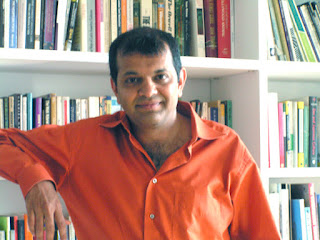Mumbai: Maximum City
Book Review
Title: Maximum City:
Bombay Lost & Found
Author: Suketu Mehta
Publisher: Penguin Books,
2004
Every city has a
fascinating history that lies beneath its imposing concrete edifices. It is the history written on invisible pages by
people who will never appear in the actual history books, people like gangsters
and prostitutes. And the person on the
street too. Suketu Mehta’s magnum opus
unravels that invisible history of Mumbai in a gripping narrative that reads
almost like a novel.
The book is divided into
three parts. Part 1, titled ‘Power’,
constitutes almost half of the book and is about the people who actually wield
the power in the city. The book speaks
about the Mumbai of 1990s and hence this part begins with the riots that assailed
the city soon after the Babri Masjid demolition in Dec 1992. The Muslims in Mumbai reacted against the
Babri Kasjid demolition and Bal Thackeray’s Shiv Sena was quick to exploit the
situation for political gains. In Jan
1993, Thackeray’s goons systematically massacred the Muslims in the city. Thackeray soon found his match in the Muslim mafia
dons who detonated ten bombs one after the other in March. The Hindu-Muslim divide became total. Now, religion determined “how often you will
bathe, where you will shit” because the water supply to the Muslim areas was
curtailed and the toilets became unusable.
Life thrives even if you
cut off basic amenities. Life will find
its own ways of moving on. But crime
becomes an integral part of such existence.
Mumbai became a city of increasing crimes. The communal divide forced the Muslim youth
to find occupations in the underworld which was dominated by Muslims. Mehta gives us a detailed description of the Mumbai
underworld. We meet the gangsters
belonging to Dawood Ibrahim and Chotta Rajan as well as of the lesser ones like
Arun Gawli and Chotta Shakeel. The
writer shows us that a gangster is essentially a narcissist with a deadly mix
of egotism and self-hatred. At the same
time, we also learn that the politicians are bigger criminals than the
gangsters. “We fight among ourselves,
but these people (the politicians) are ruining the whole world,” says Chotta
Shakeel. It is quite true too because
the gangsters never attack innocent people (except indirectly in bomb blasts or
similar situations) while the politicians pervert the people’s psyche.
 |
| Suketu Mehta |
The book shows how the
police are either helpless or are in cahoots with the gangsters. The police also employ the same strategies of
the gangsters and make use of encounter killings to eliminate certain people. “The police, the newspapers, and the courts
all keep up the fiction of the encounter killing,” says Mehta. The encounter drama is an open secret.
Titled ‘Pleasure,’ Part 2
presents the dance bars and red streets of the city. We are given detailed life stories of
Monalisa, a bar dancer, and Honey who is actually a man but dances as a woman
in a bar. This section gives us enlightening
peeps into Bollywood and its inevitable connections with both the underworld
and the red street.
The last part deals with
immigrants. People from all over the
country gravitate towards Mumbai. Once again we get some moving details about
certain individuals who tried to make their life in the maximum city. What I found most fascinating in this
section, however, is the story of a Gujarati diamond dealer who suddenly gave
up his lucrative business and took to religion.
He, along with all his family members, renounced the family’s fabulous
wealth in order to become Jain monks.
Mumbai is paap ni bhoomi, land
of sins, according to him. He had
committed his share of sins already, a fat share, in fact.
The book is a
masterpiece. Very few writers would do
the kind of research that Suketu Mehta did.
He spent more than two years with the gangsters and dance girls, with
the immigrants and other strugglers, before writing the book. He met people who matter too, people like Bal
Thackeray, police officers, Amitabh Bachchan, and a host of others. Mehta is never judgmental. He tries to put every person into
perspective; we see each one of them from various angles and feel pity rather
than contempt or hatred. We understand
them better. We understand why some
people are what they are. And that’s
precisely the greatness of the book.
A warning for the
weak-hearted: you may find the book highly disturbing in many places.

sounds very interesting I am googling the author and the book.
ReplyDeletewhats the genre and is it on flipkart?-- ParwatiSingari
I bought it from Flipkart. Easily available elsewhere too.
DeleteWonderful book indeed!
ReplyDelete:)
DeleteI've read this wonderful book and your review does it justice!
ReplyDeleteGlad to hear that, Hema.
DeleteSeems an interesting read. :)
ReplyDeleteMore enlightening than interesting, more disturbing than pacifying, more welcome than the kind of pulp that is being sold these days.
DeleteThat's an impressive amount of research. Has to be an interesting read.
ReplyDeleteIt is more than interesting. :)
DeleteReality strikes hard. And your review gives a rightful insight.
ReplyDeleteThere's a lot more I wanted to write.
DeleteAnything to do Mumbai strikes a cord. Have added this to my reading list. Great review.
ReplyDeleteYou won't be disappointed, I assure you. And thanks.
DeleteThanks for sharing such a great information..Its really nice and informative.
ReplyDeleteGold Price in Vijayawada Today